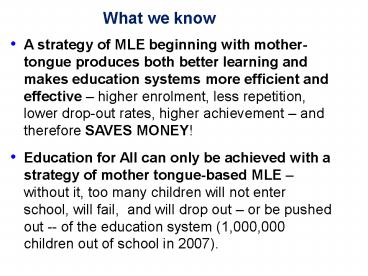What we know PowerPoint PPT Presentation
Title: What we know
1
What we know
- A strategy of MLE beginning with mother-tongue
produces both better learning and makes education
systems more efficient and effective higher
enrolment, less repetition, lower drop-out rates,
higher achievement and therefore SAVES MONEY! - Education for All can only be achieved with a
strategy of mother tongue-based MLE without it,
too many children will not enter school, will
fail, and will drop out or be pushed out -- of
the education system (1,000,000 children out of
school in 2007).
2
What we know
- Diversity is a treasure -- not only to be
tolerated or respected but welcomed and
celebrated. - Diversity is preserved by literacy both in
indigenous, minority languages and in the
national language. - Literacy in the mother tongue is an effective and
efficient approach to learning to read and write
in the national language. - Literacy in both indigenous languages and the
national language will help integrate and
strengthen society -- economically, socially,
politically, culturally not tear it apart.
3
What we know
- Through greater integration, excluded indigenous
communities can contribute more to economic and
social development. - Local communities need to play an important role
in the management of their schools and the
selection of the content and methods of
instruction. - Cultural methods of transmitting knowledge to
children (traditional pedagogy) should also be
adapted for the classroom.
4
What we know
- But there are practical difficulties, too
- MTB-MLE requires special skills for teachers
not only in the language (working fluency) but
also in combining it with L2 and in bridging
successfully to mastery of L2. ALL practicing
teachers and teacher trainees therefore need to
learn these skills. - Special approaches must be developed for
classrooms with more than one mother tongue
(e.g., schools/grades/classrooms assigned by
language, teaching assistants from each language,
selecting the most used L2)
5
What we know
- The early years of primary school are the most
important if children are not literate by the
end of grade 2, they will likely drop out or
learn little. - Good teaching, in mother tongue, and intensive
remediation for slow readers are therefore
essential. - But which grade has the most pupils? Which grade
has the youngest, least experienced teacher?
Which grade has the fewest hours of teaching each
week? In many countries, it is grade 1. - And in the Philippines?
6
What we know
- MLE is essential to achieve education which is
truly inclusive but language is only one of
many barriers to enrolment and success in school. - A good education system and a good teacher
include not only speakers of many languages but
also children of the very poor, children with
disabilities, street children and working
children, children in remote areas, and girls AND
boys equally. - All teachers must therefore become inclusive
educators, welcoming diversity and using it to
enrich the education the provide.

